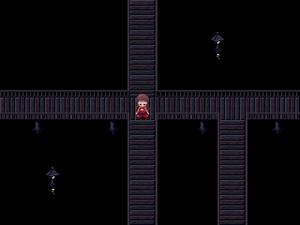>Mt.kiki No edit summary |
>Mt.kiki No edit summary |
||
| Line 38: | Line 38: | ||
==[[The Docks]]([http://en.wikipedia.org/wiki/Hashihime The maiden of the bridge])== | ==[[The Docks]]([http://en.wikipedia.org/wiki/Hashihime The maiden of the bridge])== | ||
Hashihime <span style="font-weight: normal;">(橋姫<sup>[http://en.wikipedia.org/wiki/Help:Installing_Japanese_character_sets <span class="t_nihongo_icon" style="font: bold 80%/normal sans-serif; padding: 0px 0.1em; color: rgb(0, 0, 238); text-decoration: none; font-size-adjust: none; font-stretch: normal;"><u>?</u></span>]</sup>)</span> ("the maiden of the bridge"<sup class="reference" id="cite_ref-shikibu_1-0">[http://en.wikipedia.org/wiki/Hashihime#cite_note-shikibu-1 <u>[1</u>]]</sup>) is a character that first appeared in [http://en.wikipedia.org/wiki/Japan <u>Japanese</u>] [http://en.wikipedia.org/wiki/Heian <u>Heian</u>]-period literature, represented as a woman who spends lonely nights waiting for her lover to visit, and later as a fierce “oni” or demon fueled by jealousy. She came to be associated most often with a bridge in [http://en.wikipedia.org/wiki/Uji <u>Uji</u>]. | Hashihime <span style="font-weight: normal;">(橋姫<sup>[http://en.wikipedia.org/wiki/Help:Installing_Japanese_character_sets <span class="t_nihongo_icon" style="font: bold 80%/normal sans-serif; padding: 0px 0.1em; color: rgb(0, 0, 238); text-decoration: none; font-size-adjust: none; font-stretch: normal;"><u>?</u></span>]</sup>)</span> ("the maiden of the bridge"<sup class="reference" id="cite_ref-shikibu_1-0">[http://en.wikipedia.org/wiki/Hashihime#cite_note-shikibu-1 <u>[1</u>]]</sup>) is a character that first appeared in [http://en.wikipedia.org/wiki/Japan <u>Japanese</u>] [http://en.wikipedia.org/wiki/Heian <u>Heian</u>]-period literature, represented as a woman who spends lonely nights waiting for her lover to visit, and later as a fierce “oni” or demon fueled by jealousy. She came to be associated most often with a bridge in [http://en.wikipedia.org/wiki/Uji <u>Uji</u>]. | ||
[[File:Dock.jpg|thumb|The Dock,There in the middle of the night.]] | |||
[http://en.wikipedia.org/wiki/Hashihime Japanese literature] | [http://en.wikipedia.org/wiki/Hashihime Japanese literature] | ||
| Line 57: | Line 59: | ||
大意は次の通り。(General meaning is as follows.) | |||
[http://ja.wikipedia.org/wiki/%E5%B5%AF%E5%B3%A8%E5%A4%A9%E7%9A%87 <u>嵯峨天皇</u>]の御世([http://ja.wikipedia.org/wiki/809%E5%B9%B4 <u>809年</u>]-[http://ja.wikipedia.org/wiki/825%E5%B9%B4 <u>825年</u>])、とある[http://ja.wikipedia.org/wiki/%E5%85%AC%E5%8D%BF <u>公卿</u>]の娘が深い妬みにとらわれ、[http://ja.wikipedia.org/wiki/%E8%B2%B4%E8%88%B9%E7%A5%9E%E7%A4%BE <u>貴船神社</u>]に7日間籠って「[http://ja.wikipedia.org/wiki/%E8%B2%B4%E8%88%B9%E5%A4%A7%E6%98%8E%E7%A5%9E <u>貴船大明神</u>]よ、私を生きながら[http://ja.wikipedia.org/wiki/%E9%AC%BC%E7%A5%9E <u>鬼神</u>]に変えて下さい。妬ましい女を取り殺したいのです」と祈った。 | |||
Emperor Saga's world (809 years - 825 years) and a certain court noble's daughter are caught by deep jealousy, and Kibune-Jinja is filled for seven days -- "貴船 -- a great gracious god -- please change me into a fierce god, living. It was prayed that I would like to take and kill an envious woman." | |||
明神は哀れに思い「本当に鬼になりたければ、姿を変えて[http://ja.wikipedia.org/wiki/%E5%AE%87%E6%B2%BB%E5%B7%9D <u>宇治川</u>]に21日間浸れ」と告げた。 | |||
Myojin thought that he was sad and announced "If you would like to become a demon this [ this ], change a figure and be immersed in Uji-gawa for 21 days." | |||
女は[http://ja.wikipedia.org/wiki/%E5%B9%B3%E5%AE%89%E4%BA%AC <u>都</u>]に帰ると、[http://ja.wikipedia.org/wiki/%E9%AB%AA <u>髪</u>]を5つに分け5本の角にし、 | |||
When the woman returned to the capital, in addition to the mouth, a total of five fire was burned for the torch which used hair as five angles by dividing into five, | |||
[[File:Fatsoto.png|thumb|Red face and body,Eat for rice ball(おにぎり)?]] | |||
顔には[http://ja.wikipedia.org/wiki/%E8%BE%B0%E7%A0%82 <u>朱</u>]をさし体には[http://ja.wikipedia.org/wiki/%E9%89%9B%E4%B8%B9 <u>丹</u>]を塗って全身を赤くし、 | |||
====='''put vermilion in the face, applied 丹 to the body, made the whole body red''',===== | |||
[http://ja.wikipedia.org/w/index.php?title=%E9%89%84%E8%BC%AA&action=edit&redlink=1 <u>鉄輪</u>](てつわ、鉄の輪に三本脚が付いた台)を逆さに頭に載せ、3本の脚には[http://ja.wikipedia.org/wiki/%E6%9D%BE%E6%98%8E <u>松明</u>]を燃やし、さらに両端を燃やした松明を[http://ja.wikipedia.org/wiki/%E5%8F%A3 <u>口</u>]にくわえ、計5つの火を灯した。 | |||
put at the head 鉄輪 (てつわ, stand to which 3 legs were attached to the iron ring) on reverse, and burned the torch on three foot, and also burned both ends. | |||
夜が更けると[http://ja.wikipedia.org/wiki/%E5%A4%A7%E5%92%8C%E5%A4%A7%E8%B7%AF%E9%80%9A <u>大和大路</u>]を南へ走り、それを見た人はその鬼のような姿を見たショックで倒れて死んでしまった。 | |||
If night advances, the Daiwa main street will be run to south, and the person who looked at it has fallen and died from the shock which caught a sight like the demon. | |||
そのようにして宇治川に21日間浸ると、貴船大明神の言ったとおり生きながら鬼になった。 | |||
When it was made such and immersed in Uji-gawa for 21 days, it became a demon, living as the 貴船 great gracious god said. | |||
これが「宇治の橋姫」である。 | |||
This is "橋姫 of Uji." | |||
橋姫は、妬んでいた女、その縁者、相手の男の方の親類、しまいには誰彼構わず、次々と殺した。 | |||
the woman who was jealous of 橋姫, its relation, partner's men's relative, and the end -- some-one-or-another 構わず -- it killed one after another. | |||
男を殺す時は女の姿、女を殺す時は男の姿になって殺していった。 | |||
When killing a man and killing a woman's figure and a woman, it became the man's figure and killed. | |||
京中の者が、申の時(15~17時ごろ)を過ぎると家に人を入れることも外出することもなくなった。 | |||
The person in a capital became without putting people into a house also going out, when it passed over the time of 申 (around the 15:00 ~ 17:00). | |||
Revision as of 09:17, 1 March 2013
The Docks(The maiden of the bridge)
Hashihime (橋姫?) ("the maiden of the bridge"[1]) is a character that first appeared in Japanese Heian-period literature, represented as a woman who spends lonely nights waiting for her lover to visit, and later as a fierce “oni” or demon fueled by jealousy. She came to be associated most often with a bridge in Uji.
Hashihime first appears in a Kokinshu (ca. 905) poem, of which the author is unknown:
- “Upon a narrow grass mat
- laying down her robe only
- tonight, again –
- she must be waiting for me,
- Hashihime of Uji”
Hashihime’s name also appears in Murasaki’s The Tale of Genji, as the title of a chapter. She is also mentioned several times in the waka poems throughout the work.
Sotoburu(Hashihime)
嫉妬に狂う鬼としての橋姫が現われるのは、『平家物語』の読み本系異本の『源平盛衰記』・『屋代本』などに収録されている「剣巻」で、橋姫の物語の多くの原型となっている。
橋姫 as a demon who goes mad in jealousy appears -- the reading this system of "Heike monogatari" -- it is "剣巻" recorded on "account of Genji-and-the-Heike rise and fall" - "Yashiro book" etc., and has become many prototypes of the tale of 橋姫. [ of a different book ]
大意は次の通り。(General meaning is as follows.)
嵯峨天皇の御世(809年-825年)、とある公卿の娘が深い妬みにとらわれ、貴船神社に7日間籠って「貴船大明神よ、私を生きながら鬼神に変えて下さい。妬ましい女を取り殺したいのです」と祈った。
Emperor Saga's world (809 years - 825 years) and a certain court noble's daughter are caught by deep jealousy, and Kibune-Jinja is filled for seven days -- "貴船 -- a great gracious god -- please change me into a fierce god, living. It was prayed that I would like to take and kill an envious woman."
明神は哀れに思い「本当に鬼になりたければ、姿を変えて宇治川に21日間浸れ」と告げた。
Myojin thought that he was sad and announced "If you would like to become a demon this [ this ], change a figure and be immersed in Uji-gawa for 21 days."
When the woman returned to the capital, in addition to the mouth, a total of five fire was burned for the torch which used hair as five angles by dividing into five,
put vermilion in the face, applied 丹 to the body, made the whole body red,
鉄輪(てつわ、鉄の輪に三本脚が付いた台)を逆さに頭に載せ、3本の脚には松明を燃やし、さらに両端を燃やした松明を口にくわえ、計5つの火を灯した。
put at the head 鉄輪 (てつわ, stand to which 3 legs were attached to the iron ring) on reverse, and burned the torch on three foot, and also burned both ends.
夜が更けると大和大路を南へ走り、それを見た人はその鬼のような姿を見たショックで倒れて死んでしまった。
If night advances, the Daiwa main street will be run to south, and the person who looked at it has fallen and died from the shock which caught a sight like the demon.
そのようにして宇治川に21日間浸ると、貴船大明神の言ったとおり生きながら鬼になった。
When it was made such and immersed in Uji-gawa for 21 days, it became a demon, living as the 貴船 great gracious god said.
これが「宇治の橋姫」である。
This is "橋姫 of Uji."
橋姫は、妬んでいた女、その縁者、相手の男の方の親類、しまいには誰彼構わず、次々と殺した。
the woman who was jealous of 橋姫, its relation, partner's men's relative, and the end -- some-one-or-another 構わず -- it killed one after another.
男を殺す時は女の姿、女を殺す時は男の姿になって殺していった。
When killing a man and killing a woman's figure and a woman, it became the man's figure and killed.
京中の者が、申の時(15~17時ごろ)を過ぎると家に人を入れることも外出することもなくなった。
The person in a capital became without putting people into a house also going out, when it passed over the time of 申 (around the 15:00 ~ 17:00).
Section heading
Write the second section of your page here.




